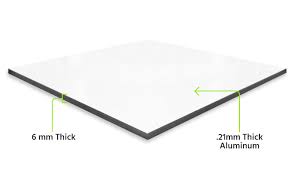Aluminum composite panels, often referred to as ACP, have become a staple in the modern construction and design world. Their versatility, durability, and aesthetic appeal make them a popular choice for architects and designers. However, their true potential goes far beyond just their physical characteristics.
The Composition and Structure of Aluminum Composite Panels
At their core, aluminum composite panels are made from two thin sheets of aluminum bonded to a non-aluminum core. This combination results in a lightweight yet incredibly strong material. The core can vary from polyethylene to fire-resistant mineral-filled cores, offering different safety levels depending on the application. What sets ACP apart is this layered structure, which not only ensures durability but also makes the material easy to handle and install. The smooth aluminum surface can be coated with a variety of finishes, from metallic shades to vibrant colors, further enhancing its visual impact.
Applications in Architecture and Interior Design
Aluminum composite panels have transformed the face of modern architecture. They are often used as cladding for building exteriors, giving structures a sleek and contemporary appearance. Beyond facades, ACP can be found in interior spaces as wall partitions, ceiling panels, and decorative elements. Designers appreciate the material’s flexibility, as it can be bent and shaped to fit creative design concepts. Whether it’s a high-rise skyscraper or a small commercial space, the ability to blend durability with elegance makes ACP a go-to material.
Durability and Weather Resistance
One of the standout features of aluminum composite panels is their resistance to environmental factors. The aluminum layers protect the core from moisture, UV radiation, and temperature fluctuations, making ACP a reliable choice for outdoor use. This weather resistance ensures the panels maintain their appearance over time, reducing maintenance costs for property owners. The corrosion-resistant properties of aluminum also mean ACP won’t rust or deteriorate even in challenging climates.
Energy Efficiency and Insulation Properties
Aluminum composite panels contribute to energy efficiency in buildings. Their core materials can offer insulation properties that help regulate indoor temperatures. This reduces the need for excessive heating or cooling, ultimately leading to lower energy consumption. In modern sustainable architecture, ACP plays a role in improving a building’s thermal performance while still offering a polished exterior.
Customization and Aesthetic Versatility
The aesthetic possibilities with aluminum composite panels are virtually endless. From brushed metallic finishes to custom digital prints, ACP can be tailored to suit any design vision. This customization capability allows designers to create unique, eye-catching facades and interiors that leave a lasting impression. Furthermore, the ability to mix colors and textures makes ACP ideal for branding purposes, such as signage and corporate spaces.
Sustainability and Eco-Friendliness
Sustainability is a growing concern in the construction industry, and aluminum composite panels are rising to the challenge. Many ACP products today are manufactured using recyclable materials, contributing to a circular economy. Additionally, their durability and low maintenance requirements mean fewer replacements and less waste over the long term. As the industry moves toward greener building practices, ACP remains a relevant and responsible choice.
Ease of Installation and Maintenance
Installing aluminum composite panels is relatively straightforward compared to other cladding materials. Their lightweight nature simplifies transportation and handling, while the panels can be cut and shaped on-site for a precise fit. Maintenance is minimal, often requiring only occasional cleaning to keep the surfaces looking pristine. This ease of installation and care makes ACP an attractive option for both new constructions and renovation projects.
Conclusion: The Multifaceted Value of ACP
Aluminum composite panels are more than just a pretty facade; they represent a perfect blend of form and function. Their structural integrity, weather resistance, and design versatility make them suitable for a wide range of applications. As the construction industry continues to evolve, ACP stands out as a forward-thinking material capable of meeting the demands of modern design and sustainability. With so many benefits packed into a single material, it’s no wonder ACP continues to gain popularity across industries.
